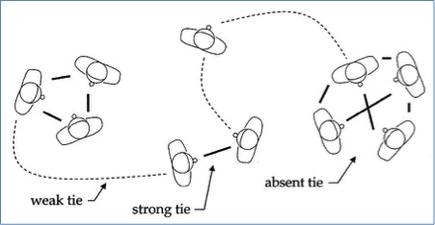
It was the morning of the first day of the annual IT conference. Sure I’d been to a few of these before. Well, I’d actually been to five or six of them since getting back from three years working in the US…I’d even presented at the conference two years earlier.
But there I was with that uncomfortable feeling in the pit of my stomach. That prickly sensation you get when you’re heading to a function, a conference or an event, when you know you’re going to have to meet and talk with people…some you know, plenty you’ve never met before. Like the feeling you had at the assembly on the first day at your new high school when you didn’t know anyone, didn’t know your class, your teacher and maybe just a few previous class mates.
Even though by definition I’m an introvert[1], I always look forward to the conference. A chance to get away from the office and get some big picture input. To catch up with some familiar faces and make some new contacts. To talk to a bunch of suppliers showing their best and latest offerings all in one place. To see new ideas, applications and systems that could improve our business.
But that tightening in my stomach still happened, although no one would ever have known. I still shake my head at myself because I know, that even after all this time, not feeling the tension is as likely as software with no bugs…
Someone who knows someone, who knows someone, could warn you of a supplier who presents well but is really like a car with a great paint job but a rusty chassis.
I’m sure that for a fortunate few, it’s anticipation with great positive feelings. However, for most of us there’s some trepidation …maybe a little, maybe a lot, it’s always there. Like the weird uncomfortable sensation you get looking down over the railing of your hotel balcony from 27 floors up.
You’re wondering what you’re going to say, who you’re going to say it to and is it all worth the effort. A feeling that maybe it’s just too hard to go and talk to someone, so you’ll just stand there by yourself pretending you’re busy checking email on your smartphone… until the first session of the conference is about to start and you can head off to find a seat.
So how do you deal with it?
You’re not alone feeling uncomfortable
First of all, realise that, the majority of people are uncomfortable in these situations and experience similar feelings.
Watch most people…have a close look. You’ll start to notice that they tend to congregate with the people they know. Even the outgoing ones do it. It’s comfortable and familiar and far easier than having to talk to someone new.
At our annual Australasian management meeting we used to have a combined meeting with the management teams, from both NZ and Australia, and their partners.
These were the local leaders of our company each with full responsibility for their part of the business. The interesting thing was that the big social evenings generally ended up with the room divided into the Aussies and the Kiwis. There were, however a small number who spanned the groups. These were the ones that made the effort, likely had to push themselves, but were the connectors. The rest (the majority) tended to mix with their respective Kiwi or Australian colleagues. They felt more comfortable with their familiar group.
So don’t feel bad – it’s something that’s a challenge for most people. But pushing past it is worth it.
Here’s why…
The surprising power of weak ties
Strong ties are the connections that bind you to your close friends and colleagues. Those you see regularly or reasonably regularly. The ones you have a personal or working relationship with.
Weak ties are the connections that are occasional and not well formed. Someone you have met but haven’t formed a firm connection with.
Read more: A little known influence approach to sidestep resistance
The people in each group of Kiwis or Aussies in the section above would be classed as having strong ties within the group. The small number who spanned the groups were the weak ties between the members of the two groups.
Weak versus Strong ties

Dr Mark Granovetter[2] details this in his ground-breaking paper ‘The Strength of Weak Ties’, based on research, that show a network of “weak ties” is one of the best things you can have.
Someone who knows someone, who knows someone, could:
- Help find the solution to your biggest issue
- Point you to a great supplier
- Get you that next role
- Find a great candidate for an open position
- Be an independent reference check of a possible candidate
- Warn you of a supplier who presents well but is really like a car with a great paint job but a rusty chassis.
Your strong ties can vouch for you. Your weak ties can help take you places you wouldn’t expect and help deliver on your dreams.
Back in November 2004, I was without a job. I’d been living and working in the US and was now back in New Zealand. I was doing what was usual at that time to find a job. Getting the newspaper every day, going straight to the jobs section, finding roles that I thought were the good ones, writing a cover letter detailing why I felt I was a great fit for the role and emailing it off with my CV.
Read more: Mission: Clarity in communication
And then the interminable wait.
I knew I had to do it, knew I had to focus on the process, knew I couldn’t sit back and hope. But not much was happening. Time was slipping by, cash was leaking from my savings.
Cue, drum roll for weak ties…
Why? Because the way I found the right role had nothing to do with that traditional process. At the encouragement of a mentor I also made a simultaneous approach to all my existing contacts in a no-pressure, systematic way via phone and email. I explained my situation, what I was looking for and asked if they knew of any roles, anyone looking or anyone I should contact.
And an unexpected chain of connections happened…something I’d hoped for, but didn’t expect and couldn’t have planned.
What matters in getting ahead in life is not how close you are to the people you know, but how many people you know that you aren't particularly close to.
I called Phil who I had worked with years ago when I was in the company’s Auckland office and he was in the Wellington head office. Phil suggested I contact Doug, a guy he knew. I called Doug and used Phil’s name to open the conversation. I explained what I was looking for. He asked me to send my CV, which I did. It turned out Doug knew Graeme the country manager of a global vendor. Graeme happened to have a customer he knew who was looking for an IS manager and passed my CV to their COO. Malcolm called me, interviewed me and ultimately offered me the role.
That’s when I truly first realised the immense power of acquaintances. This is what Mark Granovetter means by a network of weak ties. Those connections or bridges between networks of strong ties that are so important for the spread of new ideas and information.
It was a series of weak ties via three degrees of separation that led me to the job.
Most people don’t step outside their comfort zone and go talk to someone else. But in doing that they miss out on the potential to meet someone that could make a significant difference in their lives, either directly or indirectly. If you can just go and initiate the conversation it’s your chance to add to your connections of weak ties. And this could one day result in a hefty unexpected benefit in your life.
So the next time you’re about to go into a group of strangers and you’re feeling that sensation in the pit of your stomach, remind yourself of the enormous power of weak ties!
In the next article I’ll give you some highly effective tools to make it easier. We’ll cover three practical and potent approaches to use at the next event you attend, to reduce stress, raise confidence, be charming and generally help with motivation to build your network of weak ties:
- An unexpected and scientifically proven way to prepare
- The secret to great conversations
- What to do after the conversation
In the meantime go and do what your parents told you not to… go talk to strangers…it could transform your life!
References
[1] The difference between an introvert is how we recharge. Introverts need time by themselves to recharge. Extroverts seek the company of others. It’s also true that it’s a continuum and not a totally two state situation. There are also outgoing Introverts.
[2]The Strength of Weak Ties – Mark Granovetter (Sociologist and Professor at Stanford University). In his study, more than 80 per cent of the subjects found a job through a contact that they didn’t have a close relationship with (i.e. an acquaintance). What matters in getting ahead in life is not how close you are to the people you know, but how many people you know that you aren't particularly close to. There were some caveats – i.e. that the best effect was for managers and leaders and for connections to higher status individuals.
Read more: 3 surprisingly easy ways to improve your next presentation

Campbell Such is GM IT for Bidvest, a wholesale food distribution business and a top 50 company in NZ. He has a varied career in New Zealand and internationally, working in technology, management and roles in marketing and sales. Reach him at Campbell.such@bidvest.co.nz and through his blog.
Send news tips and comments to divina_paredes@idg.co.nz
Follow Divina Paredes on Twitter: @divinap
Follow CIO New Zealand on Twitter:@cio_nz
Sign up for CIO newsletters for regular updates on CIO news, views and events.
Join the CIO New Zealand group on LinkedIn. The group is open to CIOs, IT Directors, COOs, CTOs and senior IT managers.
Join the CIO New Zealand group on LinkedIn. The group is open to CIOs, IT Directors, COOs, CTOs and senior IT managers.
